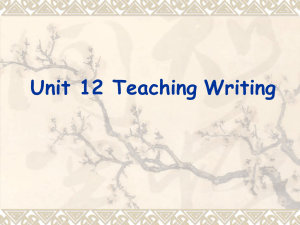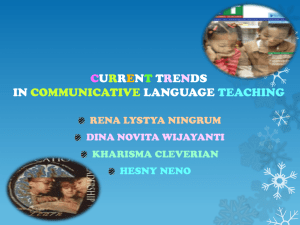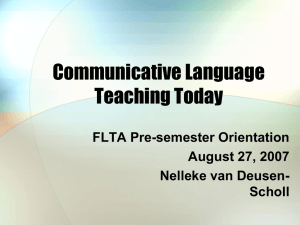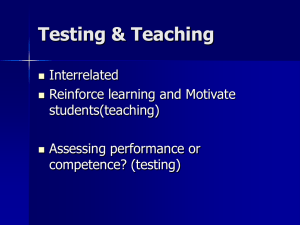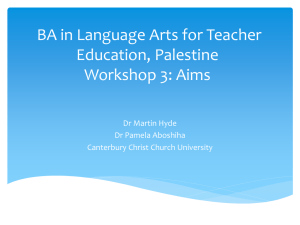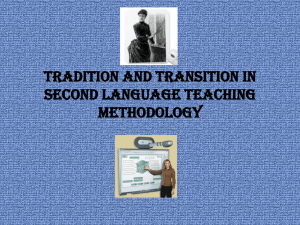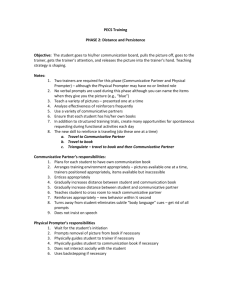Methodological discourse
advertisement
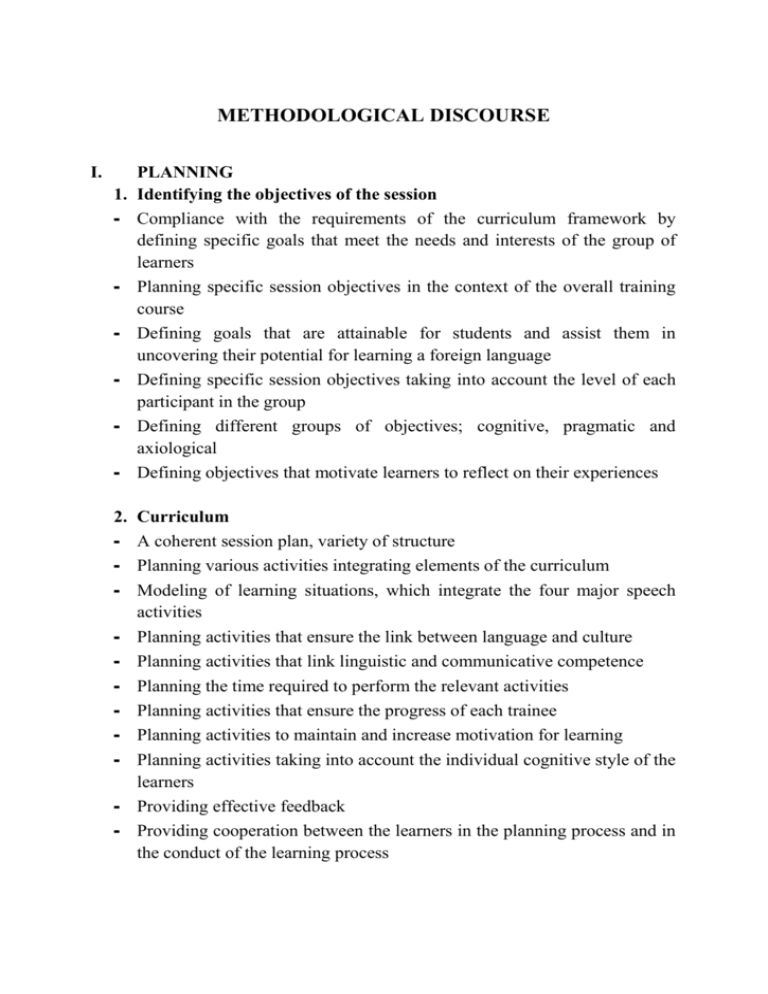
METHODOLOGICAL DISCOURSE I. 1. - 2. - PLANNING Identifying the objectives of the session Compliance with the requirements of the curriculum framework by defining specific goals that meet the needs and interests of the group of learners Planning specific session objectives in the context of the overall training course Defining goals that are attainable for students and assist them in uncovering their potential for learning a foreign language Defining specific session objectives taking into account the level of each participant in the group Defining different groups of objectives; cognitive, pragmatic and axiological Defining objectives that motivate learners to reflect on their experiences Curriculum A coherent session plan, variety of structure Planning various activities integrating elements of the curriculum Modeling of learning situations, which integrate the four major speech activities Planning activities that ensure the link between language and culture Planning activities that link linguistic and communicative competence Planning the time required to perform the relevant activities Planning activities that ensure the progress of each trainee Planning activities to maintain and increase motivation for learning Planning activities taking into account the individual cognitive style of the learners Providing effective feedback Providing cooperation between the learners in the planning process and in the conduct of the learning process 3. Forms of organization of the session - Applying various forms of organization tailored to specific audience – front, individual, in pairs, group, project, games - Planning of verbal performances / participation of the learners and interaction between them - Anticipating of use of target language and / or contact language - Providing interdisciplinary relations II. 1. - TEACHING Realization of the methodological plan Start the session in a way that motivates the learners Reacting to unforeseen situations by changing the preliminary schedule Providing schedules and logical transition between activities and tasks – individual, group and collective Compliance with the time in unforeseen situations Compliance with individual abilities for concentration of the learners Expedient focus of the attention on the essential conclusions of the course and the activities in the end of session 2. Work with the curriculum - Presentation of the new linguistic knowledge in a way consistent with the individual knowledge of the trainees and the level of the whole group - Build a relation between the old and the new content - actualization - Compliance with the specific educational context - Build a relation between the language and the culture 3. Interaction during session - Build a group climate and favorable work conditions - Holding the attention through alternating activities according their difficulty - Response by stimulating manner to initiatives coming from the trainees spontaneity - Animate the group, encouraging verbal events - Mistakes are corrected so that it is not demotivating for the learners - Develop trainees’ learning skills - autonomy 4. Management of pedagogical discourse. Moderation. Animate - Performing various pedagogical roles – “provider” of resources, mediator, observer, animator… - Creating conditions for successful individual and group activities, ensuring effective delivery and assessment of group and team activities - Effective use of various resources – ICT, boards, drawings… SESSION №1 Bulgarian alphabet Topic: „Bulgarian graphics system” Objective: Formation of basic knowledge about the structure of language and initial communicative language skills for orientation in communicative situation and selecting appropriate resources for its implementation. Tasks: Create a durable relation between sound and letter Develop skills for determine the number of sounds and their position in the word Knowledge of the graphics system Increase the concentration of the attention Improve the memory Materials: drawings, paper sheets, pens. Duration: 2 х 2 hours Flowing approach from the known to the unknown – from the established in the modern world Latin letter to still not so globally accepted Cyrillic. The similarity in the two graphics systems helps us to look for similarities in ourselves and brokes minds. Group relaxes and becomes curious. We explain already without tension more complex graphemes and their acoustic line. Overcoming the barrier of unknown the learners want now to pronounce and resemble Bulgarian speech elements. Appendix: SESSION №2 ACQUAINTANCE Topic: „Presentation and acquaintance” Objective: Formation of basic knowledge about communication and initial communicative language skills for orientation in communicative situation and selecting appropriate resources for its implementation. Tasks: Create a durable relation between word and phrase Develop skills to determine the place of the different morpho-syntactic units in the sentence’s structure Knowledge of syntactic system Increase the concentration of the attention Improve the memory Materials: drawings, paper sheets, pens. Duration: 2 х 2 hours Evolution from the single to the whole. Compilation of sentences with successively introducing grammatical categories. Learning of personal pronouns in a dialog. Polite form of the second person singular. Dialog on persons and numbers to the oral memory of the phrase. Visualization and learning the numbers from 1 to 10. Counting of specific objects. Exercising the greetings “Good morning, Good afternoon, Good evening”; “Welcome - Thanks”. Appendix: SESSION №3 HUMAN BODY Topic: „Parts of the human body” Objective: Formation of basic knowledge about the parts of human body and initial communicative language skills for orientation in communicative situation and selecting appropriate resources for its implementation. Tasks: Create durable relation between vision and phrase Develop skills to determine the place of the different types of simple sentences such question - answer in the sentence’s structure Knowledge of syntactic system Increase the concentration of the attention Improve the memory Materials: drawings, paper sheets, pens. Duration: 3 х 2 hours Learn the parts of the human body. Exercise personal pronouns with the verb “to be”. Introduction of possessive pronouns with the parts of human body in the singular – masculine, feminine and neuter. Exercise of words with question – answer. Role and pantomimes exercises combined with emphasis on pronunciation and clear diction brighten understanding of melody and accent of the language. Appendix: SESSION №4 HEALTH Topic: „Condition of the organs of the human body” Objective: Formation of basic knowledge about the condition of the human body and initial communicative language skills for orientation in communicative situation and selecting appropriate resources for its implementation. Tasks: Create durable relation between feeling and phrase Develop skills to determine the place of the different types of simple sentences such question - answer in the sentence’s structure Knowledge of syntactic system Increase the concentration of the attention Improve the memory Materials: drawings, paper sheets, pens. Duration: 2 х 2 hours The organs of the human body. Learning them through dialogs. New words: - Hospital Doctor Dentist Examination Cabinet Pharmacy Medicine Emergency. Acquaintance with several major treatment centers in Sofia and other cities. Emergency telephones. Appendix: SESSION №5 TRANSPORT VEHICLES Topic: „Understanding the key concepts for transport” Objective: Formation of basic knowledge about the transport vehicles and initial communicative language skills for orientation in communicative situation and selecting appropriate resources for its implementation. Tasks: Create durable relation between idea and phrase Develop skills to determine the place of the different types of simple sentences such question - answer in the sentence’s structure Knowledge of syntactic system Increase the concentration of the attention Improve the memory Materials: drawings, paper sheets, pens. Duration: 2 х 2 hours Accusative forms of personal pronouns. Map of Bulgaria and indication of main roads. Understanding the modes of transport in the country – pictures. Connecting the road map with specific transport vehicles. Description of how to buy tickets and cards for bus, rail transport, air traffic. Indication of places from which you can buy tickets or cards. Penalties for traveling without a ticket – for example – a train. Subtopics: use of fees and car hire / rent a car /. Learn of key concepts of the subject. Appendix: SESSION №6 MARKET Topic: „Understanding the key concepts of food, clothes and other goods for everyday life” Objective: Formation of basic knowledge about daily life needs and initial communicative language skills for orientation in communicative situation and selecting appropriate resources for its implementation. Tasks: Create durable relation between idea and phrase Develop skills to determine the place of the different types of simple sentences such question - answer in the sentence’s structure Knowledge of syntactic system Increase the concentration of the attention Improve the memory Materials: drawings, paper sheets, pens. Duration: 4 х 2 hours Acquaintance with basic food, clothes and other necessary goods for everyday life. Types of stores. Behavior patterns during the shopping. Sharply differentiate of the sale – market relations from the Eastern model. It is very difficult to overcome the attitude of bargaining within the learners. The model of fixed prices is seen slowly. Appendix:
